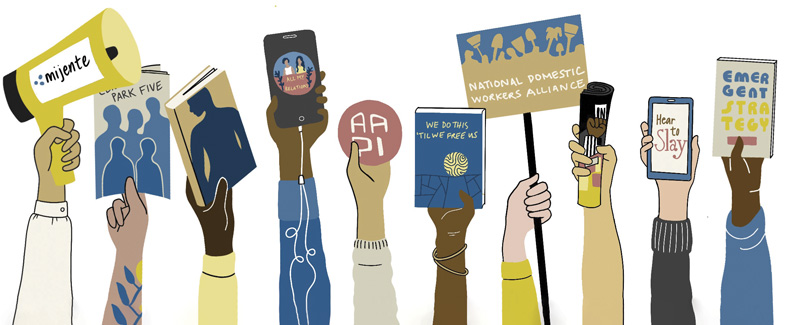
America’s racial reckoning over the last year and a half—brand new to some, nothing new to many others—has stirred an urgent call to action: do something.
“That’s a good thing,” says Sara Clarke Kaplan, director of AU's Antiracist Research and Policy Center (ARPC). But that desire sometimes prompts ill-advised searches for easy answers—and dismantling privilege and structural racism isn’t just a book or TV show away.
“This is a constant, slow process of unmaking destructive hierarchies of power and remaking other ways of relating to each other in their place,” says Kaplan, who joined AU in August, holding a joint appointment in the Departments of Literature and Critical Race, Gender, and Culture Studies.
The author of The Black Reproductive: Unfree Labor and Insurgent Motherhood, published in June, comes to AU from the University of California, San Diego. There, she cofounded the Black Studies Project, growing a modest speaker series into a $2.5 million research center.
Among Kaplan’s proudest achievements at the project’s helm: filling a void for teaching and learning about Blackness in a forward-looking way. She brings the same spirit of collaboration and innovation to ARPC.
“If our goals are justice and freedom, it’s not enough to respond or react to what is happening in the moment,” she says. “We have to always look toward what we are trying to build.”
Social change takes many forms. Here, Kaplan shares her 10 favorite racial justice projects you may not have heard of:
Mijente: A local chapter model allows Latinx people of different regions to focus on community-specific policy issues while forming an ongoing national coalition. Founded in 2015 after #Not1MoreDeportation, Mijente’s work has expanded to climate justice, policing, and more.
The Central Park Five: Former colleague Anthony Davis composed this 2019 Pulitzer Prize–winning opera about the infamous case of wrongful conviction. Like all of his operas, it uses Black vernacular musical traditions to tell a vital story of Black politics and culture.
This Bridge Called My Back: I teach this landmark, 40-year-old anthology yearly and return as a reader far more often. The women writers in This Bridge responded with incredible clarity to their political conditions in a way that still speaks profoundly to how those conditions endure.
All My Relations: This podcast by Matika Wilbur (Swinomish and Tulalip) and Adrienne Keene (Cherokee) focuses on Indigenous issues with joy and humor, powerfully counteracting a media trend of making BIPOC people into objects of suffering.
AAPI Women Lead: The #ImReady Movement challenges racialized sexual and gender-based violence in two ways: It not only centers the experiences of Asian, Asian American, and Pacific Islander women, but also supports AAPI women in leading the conversation and the movement.
We Do This ’Til We Free Us: Part of the movement to abolish mass incarceration for more than two decades, Mariame Kaba demonstrates in this collection of essays—and throughout her work—how we must work together to practice the politics of freedom we’re seeking.
National Domestic Workers Alliance: Applying a classic union model to domestic work, NDWA is made up of largely poor women of color who are underrecognized essential workers. NDWA finds strength in the rank and file, trusting workers on the ground to determine important struggles.
In These Times’s “M4BL Issue Takeover”: This inspiring July 2021 issue allows people doing Movement for Black Lives’ grassroots work—mostly women—to speak for themselves, articulating their understanding of a movement often written about in an objectifying, reductive way.
Hear to Slay: The intimacy, fierceness, and intelligence Roxane Gay and Tressie McMillan Cottom share is magical. This podcast doesn’t translate for the audience, instead allowing for growth. For a Black woman listener like me, it feels like coming home.
Emergent Strategy: When was the last time you read a political manifesto based on a science fiction series? Adrienne Maree Brown seizes upon Octavia Butler's Earthseed novels in modeling the ecofeminist perspective that change is constant and we must embrace it.